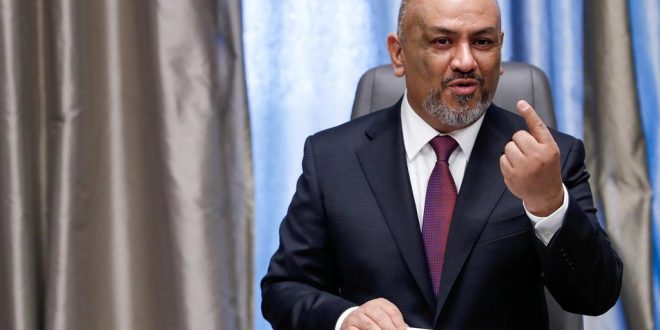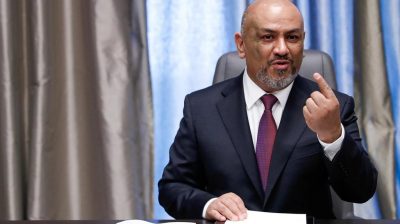Hodeidah peace deal running out of time, says Yemeni Minister of Foreign Affairs
The Houthis stall Hodeidah peace talks and look to rope coalition into costly civilian battle
Houthi rebels in Yemen are stalling UN peace negotiations in a bid to further entrench themselves in Hodeidah and drag the coalition into urban warfare in Yemen’s biggest port city, the country’s Foreign Minister said Tuesday.
Minister Khaled Al Yemany said the Houthis are “buying time” through the UN negotiation process, which is taking place during a month-long ceasefire in Hodeidah, to deploy more fighters in the densely populated city. But the Yemeni government official warned that if rebels don’t completely withdraw from the town, “they will be buried in Hodeidah.”
He said Houthis were attempting to readjust the terms, delivered by UN envoy to Yemen Martin Griffiths, to say they would only be willing to withdraw from the port area but not the city.
“If they just withdraw from the seaport it’s meaningless, they will be within 1 kilometre of the seaport and it will be a clashing point to disrupt all efforts. So, we say the full withdrawal from Hodeidah is a prerequisite for any successful outcome for these efforts,” the minister said.
Internationally backed pro-Yemeni government forces launched an offensive to recapture the Red Sea port on June 13 but paused the offensive roughly 17 days later to allow for a mediated settlement.
The minister, in Abu Dhabi for a three-day trip meeting with senior Emirati officials, said they entirely support the diplomatic process but urge the UN to understand the Houthi negotiating tactic.
“It is working on buying itself time, not on peace, I am pushing for peace and they are buying time,” he said. “Diplomatic efforts are not open-ended. There must be a moment where we say enough and we go for other options.”
A failure of diplomatic means, the minister said, would inevitably lead to the necessary military solution.
___________________
Hodeidah offensive
Peace in Yemen needs more than two parties
Arab ambassadors’ letter warn on Qatar terror impunity
___________________
The Houthis failure to withdraw from the west coast of Yemen will require the coalition to engage in a siege of Hodeidah, he said. This would entail cutting off supply and communication routes the rebels have with the capital Sanaa, which was sized by the Iranian-backed group in 2015.
The siege of Hodeidah risks worsening the humanitarian situation in the country, which experienced the worst cholera outbreak in recent history.
However, the minister said the government will continue to ensure the port remains open to receive humanitarian aid, medicine and other supplies needed to safeguard the civilian population. Furthermore, they will look to evacuate the civilian population despite efforts by the Houthis to keep them in the city as human shields.
UAE’s Reem Al Hashimy: Solution in Hodeidah could lead to final settlement in Yemen
The Yemeni government has licensed both commercial and humanitarian ships to maintain a steady supply to the port, with an average of four or five shipping vessels given clearance to dock with humanitarian supplies and aid every day.
He said they have given Mr Griffiths ample time to negotiate on the basis that the Houthis agree to the Yemeni government’s basic demands in a peace deal. The Yemeni government last met with the UN envoy earlier this week.

The first requirement for peace, as outlined by Mr Griffiths, is the entire withdrawal of the Houthi forces from Hodeidah to allow forces from the internationally recognised ministry of interior to deploy in order to maintain peace.
The second pertains to the transfer of all government entities, and commercial entities sized by the rebels in Hodeidah, back to the hands of the legitimate government under the supervision of the ministry of finance.
The third entails allowing the UN to ensure the peace and deter from the smuggling of weapons to the rebels.
“We had minor adjustments in the language, but otherwise we supported these points. But the Houthis have responded as they typically do,” Mr Al Yemany said. “They don’t want peace”.
The Houthis are believed to want to lure the coalition into an urban battle with the hope that the risk that civilians will be killed in the close-packed streets will deter and hamper the coalition operations.
“They want to get us into a street war, they think the army will go after them, but we are not planning to fight within civilian areas, knowing the impact will be huge. But we will make them wish they withdrew,” he said.
Although the coalition is willing to apply pressure on the Houthis through a military campaign, they continue to pursue a diplomatic solution.
According to the minister, Ismail Ould Cheikh Ahmed, the former UN peace envoy to Yemen, said in his last meeting, before being replaced by Mr Griffiths, that the Houthis were not looking to negotiate.
Speaking of Mr Griffiths’ predecessor, the foreign minister pointed out that “He said ‘the Houthi does not accept peace’ and then left. Will Mr Martin [Griffiths] say that? That’s what is needed because we can’t accept negotiating with a side that sends our sons and daughters into the face of death.”
On the ground: Children conscripted by Houthis subject to sexual abuse
Mr Al Yemany said that in previous negotiations with the Houthis, both in Geneva in 2015 and in Kuwait in 2016, the rebels “have always tried to make this [peace] difficult.”
“They resort to sending children to the battlefront to deter the coalition from fighting. Their primary concern is ensuring [a hold on] Hodeidah and further entrenching themselves in the country before Martin Griffiths can complete his peace mission,” he said.
Mr Al Yemany is referring to the Houthis use of child soldiers during the war. Reports last week showed the Houthis have conscripted children for front-line fighting and refused to help civilian families unless they provide members to fight for them.
Those children forcibly conscripted to fight for Houthi rebels in Yemen have been subjected to sexual abuse and indoctrinated to believe that it was their Islamic duty to fight the pro-government forces, according to a Saudi aid organisation.
The Houthis have also been using coercion to apply pressure on families to volunteer their men. Recruitment attempts extended throughout the country where Houthis are monitoring civilians in the port city as potential conscripts.
“And you see them surrendering easily because they do not want to fight because they have no reason to fight other than Houthis pressuring their families,” he said.
Mr Yemany urged the international community and the UN to apply pressure on the Houthis and to help the Yemeni government, supported by the Arab Coalition, reach a political solution. But that failure for the Houthis to understand what’s at stake will result in a forceful reaction.
“We ask the international community to help deliver a message to the rebels and anyone who supports them, that it’s enough, enough of the destruction of Yemen, enough of the bloodshed. The rebels must understand that blood is not dispensable, and the moment of reckoning will come and they will pay.”
 Ministry of Foreign Affairs and Expatriates Official Web Site
Ministry of Foreign Affairs and Expatriates Official Web Site


